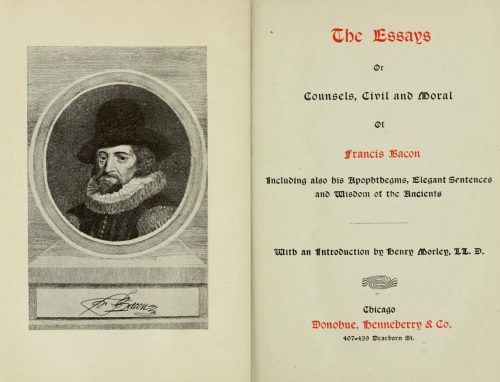Essay Of Honor And Reputation by Francis Bacon
THE winning of honor, is but the revealing of a man’s virtue and worth, without disadvantage. For some in their actions, do woo and effect honor and reputation, which sort of men, are commonly much talked of, but inwardly little admired. And some, contrariwise, darken their virtue in the show of it; so as they be undervalued in opinion. If a man perform that, which hath not been attempted before; or attempted and given over; or hath been achieved, but not with so good circumstance; he shall purchase more honor, than by effecting a matter of greater difficulty or virtue, wherein he is but a follower. If a man so temper his actions, as in some one of them he doth content every faction, or combination of people, the music will be the fuller. A man is an ill husband of his honor, that entereth into any action, the failing wherein may disgrace him, more than the carrying of it through, can honor him. Honor that is gained and broken upon another, hath the quickest reflection, like diamonds cut with facets. And therefore, let a man contend to excel any competitors of his in honor, in outshooting them, if he can, in their own bow. Discreet followers and servants, help much to reputation. Omnis fama a domesticis emanat. Envy, which is the canker of honor, is best extinguished by declaring a man’s self in his ends, rather to seek merit than fame; and by attributing a man’s successes, rather to divine Providence and felicity, than to his own virtue or policy.
The true marshalling of the degrees of sovereign honor, are these: In the first place are conditores imperiorum, founders of states and commonwealths; such as were Romulus, Cyrus, Caesar, Ottoman, Ismael. In the second place are legislatores, lawgivers; which are also called second founders, or perpetui principes, because they govern by their ordinances after they are gone; such were Lycurgus, Solon, Justinian, Eadgar, Alphonsus of Castile, the Wise, that made the Siete Partidas. In the third place are liberatores, or salvatores, such as compound the long miseries of civil wars, or deliver their countries from servitude of strangers or tyrants; as Augustus Caesar, Vespasianus, Aurelianus, Theodoricus, King Henry the Seventh of England, King Henry the Fourth of France. In the fourth place are propagatores or propugnatores imperii; such as in honorable wars enlarge their territories, or make noble defence against invaders. And in the last place are patres patriae; which reign justly, and make the times good wherein they live. Both which last kinds need no examples, they are in such number. Degrees of honor, in subjects, are, first participes curarum, those upon whom, princes do discharge the greatest weight of their affairs; their right hands, as we call them. The next are duces belli, great leaders in war; such as are princes’ lieutenants, and do them notable services in the wars. The third are gratiosi, favorites; such as exceed not this scantling, to be solace to the sovereign, and harmless to the people. And the fourth, negotiis pares; such as have great places under princes, and execute their places, with sufficiency. There is an honor, likewise, which may be ranked amongst the greatest, which happeneth rarely; that is, of such as sacrifice themselves to death or danger for the good of their country; as was M. Regulus, and the two Decii.











